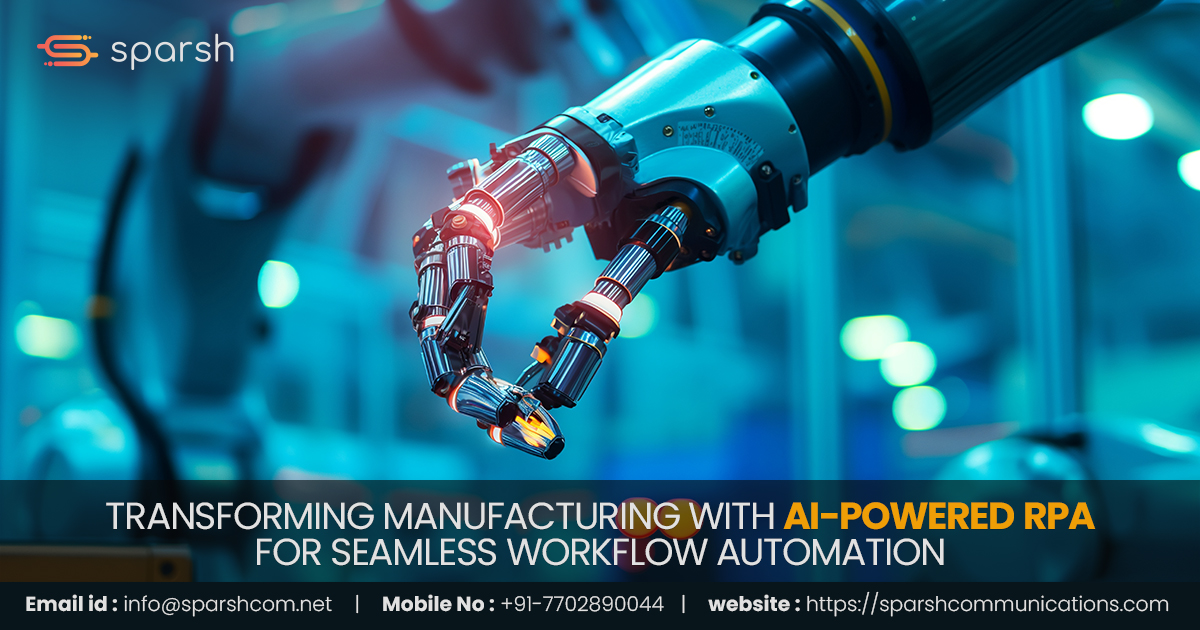Transforming Manufacturing with AI-Powered RPA for Seamless Workflow Automation
1. The emergence of RPA, or robotic process automation
Within the quickly evolving manufacturing industry, robotic process automation, or RPA, has emerged as a transformative technological advancement. RPA automations streamline repetitive tasks, enhance efficiency, and reduce operational costs. The rise of RPA has revolutionized industries, making processes faster and more accurate, thus allowing human workers to focus on more strategic tasks.
2. The Daily Use of Robotic Process Automation in Manufacturing
In the manufacturing industry, Robotic Process Automation (RPA) has become an integral part of daily operations. Numerous repetitive tasks are made easier by RPA automations, including supply chain coordination, inventory management, and order processing. These automated systems work around the clock, ensuring that processes are efficient and error-free.
For example, RPA tools can monitor production lines, instantly identifying defects and ensuring that only top-quality products reach the market. In addition, RPA can manage routine administrative tasks such as updating records, generating reports, and handling communications with suppliers and customers. Through the delegation of these routine tasks, RPA increases overall productivity by freeing up human workers to concentrate on more strategic and innovative work.
3. RPA’s Advantages for Manufacturing
Robotic Process Automation offers numerous benefits to the manufacturing sector, including:
- Increased Efficiency: RPA software works tirelessly, speeding up processes and ensuring consistent output. This leads to faster production cycles and quicker time-to-market for products.
- Cost Savings: By automating repetitive tasks, RPA reduces the need for manual labor, leading to significant cost savings. It also reduces mistakes, which saves money and rework.
- Scalability: RPA solutions are highly scalable. As a business grows, automation can be expanded to accommodate increased workloads without additional strain on resources.
- Better Quality: Automation guarantees accuracy and consistency, which results in fewer defects and better-quality products. Customer satisfaction rises, and returns are reduced as a result.
- Data Management: RPA can handle vast amounts of data, providing real-time insights and analytics that help in better decision-making and strategic planning.
4. AI and RPA in the Manufacturing Sector: An Intersection
The intersection of Robotic Process Automation and Artificial Intelligence (AI) is revolutionizing the manufacturing industry. While RPA excels at automating rule-based tasks, AI brings cognitive capabilities to the table, enabling machines to learn from data, recognize patterns, and make informed decisions.
For instance, AI-powered RPA can predict equipment failures by analyzing historical data and identifying patterns that precede breakdowns. Predictive maintenance increases machine longevity, which reduces downtime. Moreover, AI can optimize supply chain management by forecasting demand, managing inventory levels, and identifying the best suppliers.
5. Successful manufacturing of RPA applications powered by AI
AI-powered RPA has a wide range of applications in manufacturing:
- Predictive Maintenance: AI is able to plan maintenance before an equipment failure occurs by analyzing data from sensors and machines to determine when an equipment breakdown is likely to occur.
- Quality Control: AI can inspect products at various stages of production, identifying defects and ensuring only the best products reach the market.
- Supply Chain Optimization: AI can forecast demand, assess market trends, and optimize inventory levels to make sure the right products are available when they are needed.
- Customer Service: AI-powered chatbots and virtual assistants can handle customer inquiries, process orders, and provide support, enhancing customer satisfaction.
6. The Future of RPA in Manufacturing
With ongoing developments in AI and machine learning spurring additional innovation, the future of RPA in manufacturing appears bright. As AI algorithms become more sophisticated, they will enable even greater levels of automation and efficiency. Here are some trends to watch:
- Hyperautomation: Combining multiple technologies, including AI, RPA, and machine learning, to automate complex business processes end-to-end.
- Intelligent Automation: AI and RPA will work together to handle more complex tasks, such as decision-making and problem-solving, without human intervention.
- Increased Collaboration: RPA will become more collaborative, with bots and humans working together seamlessly to achieve business goals.
- Enhanced Analytics: AI-powered RPA will provide deeper insights into operations, helping businesses optimize processes and drive continuous improvement.
7. How Automation Can Be a Game-changer in Manufacturing
Automation, particularly AI-powered RPA, is set to be a game-changer in the manufacturing industry. By integrating industrial automation solutions, manufacturing and automation companies can achieve:
- Higher Productivity: Constantly running automated systems results in significantly higher production rates.
- Better Quality: Products with fewer defects and higher quality are produced through precise and consistent automation processes.
- Flexibility: Automation production systems and computer-integrated manufacturing enable manufacturers to quickly adapt to changes in demand and production requirements.
- Better Resource Management: Efficient automation helps in optimizing resource utilization, reducing waste, and improving sustainability.
Conclusion
AI-powered RPA is transforming the manufacturing industry, offering unprecedented levels of efficiency, cost savings, and innovation. By leveraging robotic process automation software and integrating AI capabilities, manufacturers can streamline their operations, improve product quality, and enhance customer satisfaction. The future of manufacturing is bright, with AI-powered RPA leading the way towards a more automated and intelligent industry.
Ready to revolutionize your manufacturing processes with AI-powered RPA? Contact us today to discover how our advanced automation solutions can help your business achieve unparalleled efficiency and growth. Embrace the future of manufacturing automation with us.










